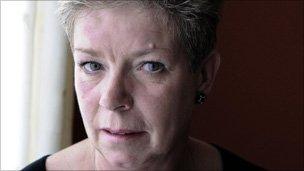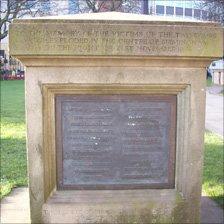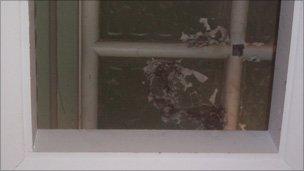'Birmingham pub bombers will probably never be found'
- Published

Maureen Mitchell was seriously injured in the pub bombings
The release of the Birmingham Six 20 years ago was a day of celebration for those who had fought for years to prove the men's innocence.
But confirmation that six men had been wrongly convicted re-ignited the pain for many victims of the pub bombings.
On 21 November, 1974, Maureen Mitchell (then Carlin) went to meet her fiance Ian Lord in the Mulberry Bush pub in central Birmingham as she often did.
It was a Thursday night and Maureen, then 21, was looking forward to the weekend.
"We lived in different parts of Birmingham so we usually met in town," she said.
"We were getting married the next year and we were both looking forward to it and had started looking for a house."
The couple often met friends in the busy pub, at the base of Birmingham's 25-storey Rotunda, but that night it was just the two of them.
But as the couple chatted and enjoyed a drink, a man telephoned the Birmingham Post and Mail to warn two bombs had been planted in the city centre.
Officers in Birmingham, which had seen a spate of IRA bombings during the mainland campaign, rushed to the scene, but they were too late.
Twenty-one people were killed and 182 suffered injuries.
Mrs Mitchell said: "I didn't hear the explosion. To me it was the lights going off and the next thing I was floating through the air.
"I remember landing on the floor and Ian was crawling towards me. I was under quite a lot of rubble, but I didn't think I was badly injured."
She was carried outside by a security guard and lay on a wall waiting for an ambulance for "what was probably minutes but felt like hours".
Last rites
Shrapnel from the blast had lodged into her bowel and she had also suffered severe leg injuries and burns which tore deep into her arm muscle. Her fiance had suffered facial injuries.
At the hospital, Mrs Mitchell remembers shouting for drugs to ease the pain before being operated on.
Mrs Mitchell, whose late father was from Northern Ireland, was given the last rites in intensive care.
But she slowly recovered and after a month in hospital went home determined to get married, as planned, the following June.

Mrs Mitchell campaigned for a memorial to be built
As the years went by, Mrs Mitchell, 58, carried on with her life but found the publicity which flared up around the case difficult to handle.
Mrs Mitchell kept details of the appeals by the six men who were convicted of the bombings in 1975 in scrap books.
In 1991, she was expecting the men's convictions to be quashed but heard the news from a phone call by a journalist.
"I then had the press camping on my door step - it was a horrendous day," she said.
" … For days it was just devastating. It was like a prop had been taken away and at that particular moment it was devastating."
Mrs Mitchell, who campaigned to get a memorial for the bombing victims at the city's cathedral, began to realise they may never find out who was responsible for the attacks.
"For a lot of years I wanted them to find someone, I wanted someone to pay for it. Everyone wants closure," she said.
"But I've had to accept in this case we will probably never get it. I would like to know who really did it, but after 37 years I don't think that is going to happen."
She and Ian Lord later divorced, but the couple, who have a son, remain friends.
Bomb 'survivor'
In 2000, she went to the Glencree Centre for Peace and Reconciliation in Wicklow, Ireland, which was set up to support victims of the Troubles.
She heard the stories of many people, including women whose soldier sons had been killed and former IRA members.

Bomb damage can still be seen in the ceiling of the building next door to the former Tavern in the Town
"It was quite an emotional time, hearing this raw pain from people," she said.
Mrs Mitchell attended many courses at the centre and made some "wonderful friendships" and found much support and strength from others.
"When I went to Glencree I started to feel like a survivor rather than a victim," she added.
Through the centre, she also met former IRA men who had been freed as part of the peace process.
She said two of these men had told her the Birmingham pub bombings were "a mistake" that the IRA would never publicly apologise for.
Although shocked at the time, she said she had now "99% accepted" that she will not find out who carried out the bombings or get an apology.
Mrs Mitchell said she did not often think about the bombings, but laid flowers at the memorial stone dedicated to its victims on every anniversary of the attacks.